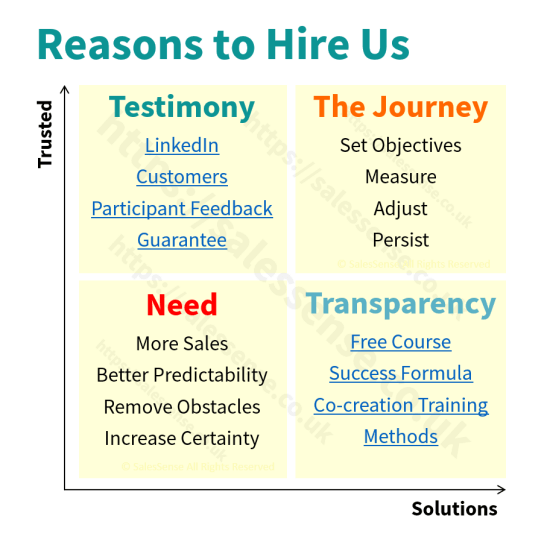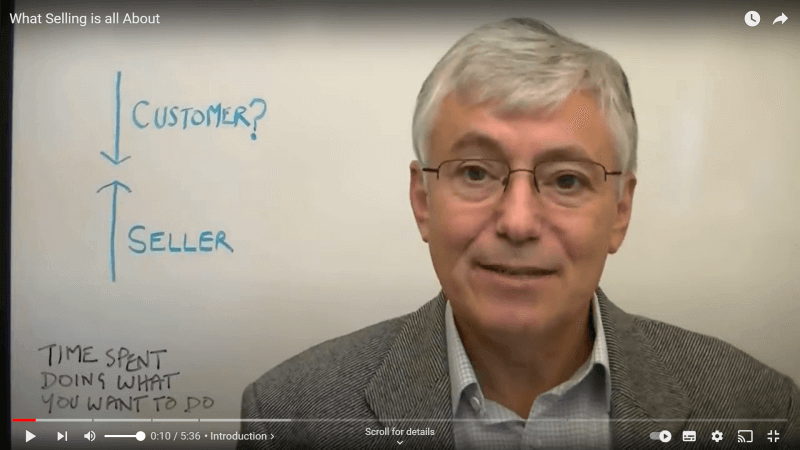Develop the right skills and methods with a professional sales training course.

Get up to speed fast with a professional sales training foundation. Study the skills, habits, and methods of high-earning professional salespeople.
What sets professional sales training courses apart from others?
- Access to the content in advance.
- Content based on commonly held best practices and skills. See the essential content appended below.
- Using the in-course time for planning, practise, and constructing new habits.
- The creation of workplace actions for embedding learning in participant routines and habits.
- The opportunity for one-to-one learning.
- Delivery by the course author.
- Guaranteed results.
Find the right customers, add unique value, and help customers succeed. Establish strategic supplier status and become a customer's trusted advisor. Establish a B2B sales career, develop professional selling skills, and increase sales performance with this professional sales training course.
Programme Objectives
- Establish the right habits and practices for success in a sales career.
- Have people think what you want them to think.
- Find prospects with an immediate need for what you sell.
- Develop or improve telephone sales skills.
- Use pipeline management to guide priorities.
- Score sales opportunities to identify the next actions.
- Develop or improve interpersonal communication.
- Learn to adapt for difficult personalities.
- Use questions to persuade.
- Use listening to persuade.
- Understand the psychology of decision-making.
- Acquire a proven consultative sales process.
- Overcome obstacles and turn around objections.
- Develop or improve sales presentation skills.
- Develop or improve sales letter and proposal writing.
- Be ready when the customer starts negotiating.
- Improve negotiation outcomes for you and the customer.
- Close sales with confidence and certainty.
- Improve planning and productivity.
- Practise applying learning in simulations and exercises.
Course Content:
Introduction: Goals, objectives, and learning management.
Understanding Excellence: Characteristics of top performers.
Pipeline Mechanics: Always having enough worthwhile opportunities.
Customer Questions: Preparing persuasive answers.
Only Sell to Hungry People: Ruthless exclusion of time wasters.
Step by Step First Contact: Starting a sales conversation.
Unspoken Influence: Nonverbal and indirect communication.
Passive Persuasion - Questions: Have people think what you want them to think.
Passive Persuasion - Listening: How to listen persuasively.
Accounting for People's Differences: Adapting for personality style.
Weapons of Influence: The psychology of persuasion.
Discovery and Collaboration: How to have the customer do the selling.
Quantified Qualification: Will it happen, can you win, and will it be worthwhile?
Presentations: Presenting online and otherwise.
Proposals: How to write winning proposals in less time.
Gaining Commitment: Closing and handling objections.
Negotiations: How to protect both your and the customer’s win.
Career Planning: Competence and opportunities.
Planning to Perform: Using thinking tools to create effective plans.
Review and Next Steps: How to transform learning into results.
Who should attend:
New business-to-business salespeople, those without previous professional sales training, and those seeking an up-to-date refresher. Suitable for people who want to launch or re-establish a business-to-business sales career.
Typical Participant Comments:
Great learning experience. Simulation exercises and group work helped a lot. Useful reference material. From Tata Telecommunications
Very practical and hands-on. Liked the fact it has been spread out over a number of weeks. Clive came across as diligent, supportive and demonstrated a very good understanding of the issues I am facing on a daily basis. His suggestions have not only been taken on board, I am actually already using them. From Integralis
The course is a real eye-opener, good at pointing out issues and factors that may be missed/taken for granted and teaching how we can use this to our advantage. From Bfi Optilas
Additional Benefits
- Flexible multi-session 'learning by doing' structured training.
- Workplace assignments develop new habits and practices.
- Tools, templates, frameworks, and examples save time and aid learning.
- Common language improves communication and teamwork.
- Promotes adoption of best practices, habits and methods.
- Increases sales productivity, consistency, and results.
- Improves job satisfaction and motivation.
- Reduces staff turnover.
Professional Sales Training Course Delivery Options
- Join a scheduled course consisting of 20 weekly one-hour virtual classroom training sessions with a maximum of seven other participants. £995 - Learn more. See the booking page for discount offers. 🛒
- One-to-one with the course author. Start immediately. £1995 - Learn more. Booking page. 🛒
- Self-led learning with trainer support. Start immediately. £495 - Learn more. Booking page. 🛒
- One-to-one on a per-session basis. Select from the 20 modules. £150 - Learn more. Booking page. 🛒
- Group training via 10 two-hour or 20 one-hour sessions. £7995 - Learn more. Booking page. 🛒
- Group training on a per-session basis. Select from 20 modules. £450 - Learn more. Booking page. 🛒
- Train the trainer. Includes a 100-participant delivery licence: £4995 - Learn more. Booking page. 🛒
- All sessions include access to presented material, tools, templates, and recordings.
- Fees exclude applicable VAT.
- Traditional Classroom - Delivery over one or more days at a conference venue or at the customer's offices. Learn more.
What should professional sales training help with?
This section presents key aspects of a comprehensive professional sales training course:
Know Your Customer’s Business Challenges
Conduct in-depth research: Before engaging with potential clients, ensure you thoroughly understand their business landscape, industry-specific challenges, and how your solution can address their unique problems.
Provide bespoke offerings: Avoid generic pitches. Customise your proposals to align directly with the specific needs of each business.
2. Develop Lasting Client Relationships
Focus on long-term connections: B2B sales often take time, so building a relationship based on trust and mutual respect is essential for long-term success.
Consistent communication: Stay in regular contact, providing value at each stage of the sales journey. Engaging consistently ensures your clients feel supported.
Target key influencers: Identify and engage with the individuals who have decision-making power within the company to streamline the buying process.
3. Use Testimonials and Case Studies to Build Credibility
Showcase success stories: Demonstrating how you’ve helped other businesses through case studies and client testimonials adds credibility to your offering.
Offer references: Allow potential customers to speak with existing or past clients to gain confidence in your service.
4. Lead with Value
Educate potential clients: Provide insights through industry reports, articles, or webinars that are relevant to your client’s challenges. This positions you as a helpful resource.
Advisory approach: Rather than just selling, act as a consultant, offering solutions that directly benefit the client, even if it doesn’t result in an immediate sale.
5. Stay Persistent Without Being Overbearing
Maintain follow-ups: Regularly reach out to stay on the prospect’s radar, but do so with purpose and care to avoid being seen as overly persistent.
Offer value with each contact: Ensure every follow-up contains new, valuable information, such as updates, insights, or solutions to a concern the client has expressed.
6. Streamline the Sales Process
Use sales tools effectively: Utilise CRM systems and other sales enablement technologies to keep track of your prospects, interactions, and progress through the sales funnel.
Enhance efficiency: Develop a clear, structured sales process that helps manage objections, assess the needs of the client, and close deals efficiently.
7. Qualify Leads Early
Identify your ideal client type: Focus your efforts on prospects who are a strong fit for your solution in terms of their needs and potential value.
Follow qualification frameworks: Apply frameworks like BANT (Budget, Authority, Need, Timing) to assess whether the prospect has the necessary resources and intent to purchase.
8. Nurture Prospects Until They’re Ready to Buy
Implement nurturing strategies: For leads that aren’t yet ready to make a decision, keep them engaged with automated email sequences, updates, or occasional check-ins until they’re prepared to proceed.
9. Customise Every Pitch
Tailor your message: Ensure your presentations and proposals are personalised to the prospect’s pain points and highlight how your solution is specifically relevant to their needs.
Solution-oriented focus: Rather than listing product features, concentrate on how your offering can solve the business problems they are facing.
10. Monitor Performance and Continuously Improve
Track your results: Use key performance indicators (KPIs) like conversion rates and lead-to-customer timelines to monitor the success of your sales strategies.
Refine and optimise: Based on the data collected, consistently improve your sales approach by experimenting with different tactics and strategies.
By following these B2B sales practices, you’ll not only build stronger client relationships but also improve your chances of converting leads into long-term business partners.
Want Something Else? Please Ask:
- Telephone 01392 851500 to book any delivery option.
- Send an email to jimm@salessense.co.uk.
Flexible Support
If you are looking for a professional sales training course or need to develop professional selling skills, we can help. Telephone +44 (0)1392 851500. We will be pleased to learn about your needs and discuss some options. Alternatively, email custserv@salessense.co.uk or use the contact form here.






















